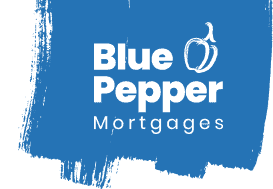Mortgage Types/Jargon Busting
- Expert Mortgage Advisers
- We Work with Dozens of Lenders
- Access to Competitive Rates
Get in touch for a no-obligation chat with an advisor about the most suitable mortgage option for you.
Mortgage Types | Blue Pepper Mortgages
When you start looking into mortgages you’ll uncover all kinds of new terminology. Here, we go through the main types of mortgages and what’s involved.
Fixed-rate mortgage
Probably the most commonly recommended mortgage type, a fixed-rate mortgage gives you total clarity over your monthly mortgage payments. You lock in a fixed-rate of interest for two, three, five years, or longer. You don’t need to worry about how the economy might affect your mortgage – your rate won’t change, whatever happens.
At the end of the fixed term, you revert to your lender’s standard variable rate, which is normally higher. If you arranged your mortgage with a broker like Blue Pepper Mortgages, we would contact you six months before your fixed rate ends and recommend an appropriate product to take its place.
Variable-rate mortgage
‘Variable-rate’ is a generic term that describes any non-fixed rate mortgage. Payments can go up or down depending on either the Bank of England’s interest rate or the rate set by the lender.
Tracker mortgage
A tracker mortgage is variable, and normally tracks the Bank of England base rate. A typical tracker will sit at 1% above base rate, and the lender doesn’t control whether rates go up or down. As a result, your mortgage payments can increase or decrease during the tracker period, which is normally two years.
Discounted mortgage
A discounted rate mortgage gives you a discount on a lender’s standard variable rate for a predetermined period, normally two years. These mortgages don’t track the base rate, the lender decides whether rates increase or decrease and by how much.
Offset mortgage
If you have a good level of savings, an offset mortgage can save you interest. For example, If your mortgage is £150,000 and you have £50,000 in savings with the same lender, they will ‘offset’ £50,000 – so you only pay interest on the remaining £100,000.
Capital repayment mortgage
With a capital repayment mortgage, your monthly payment is split between paying back the money you’ve borrowed and covering the interest on the loan. By the end of your mortgage term – typically 25 years, you will have repaid the debt and the property will be yours outright.
Interest only mortgage
With an interest only mortgage, you are only paying the interest – you’re not reducing the size of the debt. At the end of the mortgage term, if you borrowed £100,000, you would still owe £100,000. So you will need to have a plan in place to pay back that sum.
Flexible mortgage
With a flexible mortgage, you have more control over how much you pay into the mortgage and when. You can make overpayments or deposit savings into the mortgage to reduce it more quickly, or you can take a break from payments when you need to.
It’s particularly suited to people who gain commission or bonuses at work, and their monthly income varies considerably.
Cashback mortgage
With a cashback mortgage, the borrower receives an additional payment on top of the money they borrow. It can be a fixed amount or a percentage and is tax free. A typical amount is £300 to £500, which can help with covering legal fees.
Overpayments
If you can pay more than your monthly mortgage repayment, you will repay the debt more quickly and reduce the overall interest you’re charged.
You can either change your direct debits to pay a certain amount more each month – say £100 or so, or you can pay a lump sum when you have it. Some mortgages limit the level of overpayment allowed.
Payment breaks
You can also request a payment break or a payment holiday if you are under financial pressure for any reason. You must talk to your lender, though, to avoid any negative consequences.
Porting your mortgage
Your mortgage is normally tied to you rather than the property you own. If you move house, some lenders will allow you to take the mortgage with you – this is called porting your mortgage.
Guarantor mortgage
This is where a third party, usually a close relative, guarantees to pay your mortgage if you’re unable to do so. This type of mortgage is less common these days, but it’s a good option if you have bad credit or want to borrow more than most lenders are offering.
Family assistance mortgage
These are growing in popularity in place of guarantor mortgages. They are designed for family members to offer financial support for their relatives to buy a home. How it works can vary. Sometimes a relative can deposit savings with the lender for a fixed period, say five years, to act as collateral for the mortgage. Alternatively, they can use the equity in their home.
Right to Buy
This scheme gives council tenants the opportunity to purchase the property they rent at a discounted value. A similar scheme is in place for Housing Association tenants, called Right to Acquire.
YOUR HOME MAY BE REPOSSESSED IF YOU DO NOT KEEP UP REPAYMENTS ON YOUR MORTGAGE
Blue Pepper Mortgages Limited is an appointed representative of PRIMIS Mortgage Network. PRIMIS Mortgage Network is a trading style of First Complete Ltd which is authorised and regulated by the Financial Conduct Authority
Useful Links
Why Choose Us?
- Over 75 years experience in the industry
- Access to a panel of lenders which is representative of the whole of the market
- Impartial mortgage and protection advice
- Can meet at a time convenient for you
